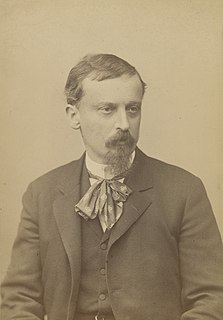A Quote by Stefan Zweig
for the more a man restricts himself the closer he is, conversely, to infinity.
Related Quotes
It is a mystic maxim that the lower in the scale of evolution a being is placed, the more certainly it responds to the planetary rays, and conversely the higher we ascend in the scale of attainment, the more the man conquers and rules his stars, freeing himself from the leading strings of the Divine Hierarchies.
The discovery of the good taste of bad taste can be very liberating. The man who insists on high and serious pleasures is depriving himself of pleasure; he continually restricts what he can enjoy; in the constant exercise of his good taste he will eventually price himself out of the market, so to speak. Here Camp taste supervenes upon good taste as a daring and witty hedonism. It makes the man of good taste cheerful, where before he ran the risk of being chronically frustrated. It is good for the digestion.
We are like droplets of water in an ocean of consciousness; individual to an extent, but those droplets together make up the ocean -- without the droplets there is no ocean. It is the same with this infinite energy mind we call creation/god. We are not part of that infinity -- we are that infinity if we open ourselves up to reconnect with it. Wherever you stand in infinity, you are at the center of infinity. So everything that exists is everything that exists. I am everything that exists; and so are you -- the more you realize that, the more you open up to the full infinity of who you are.
The man who has given himself to his country loves it better; the man who has fought for his friend honors him more; the man who has labored for his community values more highly the interests he has sought to conserve; the man who has wrought and planned and endured for the accomplishment of God's plan in the world sees the greatness of it, the divinity and glory of it, and is himself more perfectly assimilated to it.
The car shot forward straight into the circle of light, and suddenly Arthur had a fairly clear idea of what infinity looked like. It wasn’t infinity in fact. Infinity itself looks flat and uninteresting. Looking up into the night sky is looking into infinity—distance is incomprehensible and therefore meaningless. The chamber into which the aircar emerged was anything but infinite, it was just very very very big, so big that it gave the impression of infinity far better than infinity itself.
The heaviest of burdens is simultaneously an image of life's most intense fullfillment. The heavier the burden, the closer our lives come to the earth, the more real and truthful they become. Conversely, the absolute absence of a burden causes man to be lighter than air, to soar into new heights, take leave of the earth and his earthly being, and become only half real, his movements as free as they are insignificant. What then shall we choose? Weight or lightness?
Savings represent much more than mere money value. They are the proof that the saver is worth something in himself. Any fool can waste; any fool can muddle; but it takes something more of a man to save and the more he saves the more of a man he makes of himself. Waste and extravagance unsettle a man's mind for every crisis; thrift, which means some form of self-restraint, steadies it.






































